
ANALES DE LA LITERATURA ESPANOLA CONTEMPORANEA
Scope & Guideline
Engaging Minds with the Pulse of Modern Literature
Introduction
Aims and Scopes
- Contemporary Spanish Literature and Theater:
The journal focuses on the analysis and critique of contemporary works of literature and theater, examining how these forms interact with cultural, social, and political issues in Spain. - Interdisciplinary Research:
Encouraging the integration of various academic disciplines, the journal promotes studies that intersect literature with fields such as history, sociology, and cultural studies, enriching the understanding of texts within their broader contexts. - Historical Contextualization:
Papers often delve into the historical background of Spanish literature, particularly concerning periods of exile, civil war, and dictatorship, analyzing how these elements influence contemporary narratives. - Cultural Identity and Memory:
The journal explores themes of identity, memory, and trauma, particularly in relation to the Spanish Civil War and the experiences of exile, reflecting on the complexities of Spanish cultural heritage. - Gender Studies and Feminism:
There is a significant emphasis on gender perspectives, with numerous articles addressing female representation in literature and theater, as well as feminist critiques of traditional narratives.
Trending and Emerging
- Ecocriticism and Environmental Themes:
Recent publications increasingly focus on the intersection of literature and ecology, exploring the role of theater in addressing ecological crises and promoting sustainable narratives. - Theatrical Innovations and Alternative Forms:
There is a growing interest in alternative theatrical practices and performances, reflecting contemporary experimental approaches that challenge traditional theatrical conventions. - Exile and Diaspora Narratives:
The theme of exile remains prominent, with a renewed focus on the narratives of diasporic communities, emphasizing their contributions to contemporary Spanish literature and challenging notions of national identity. - Digital Humanities and New Media:
Emerging discussions on the impact of digital technologies and new media on literature and theater suggest a trend towards exploring how contemporary authors engage with these tools in their storytelling. - Intersectionality in Literary Studies:
The journal is increasingly addressing intersectional perspectives, particularly concerning gender, race, and class, reflecting a broader trend towards inclusivity and diversity in literary criticism.
Declining or Waning
- Traditional Literary Forms:
There has been a noticeable decrease in the exploration of classical literary forms and authors, indicating a shift towards more contemporary and experimental narratives. - Focus on Early 20th Century Literature:
Papers examining early 20th-century Spanish literature, particularly pre-Civil War works, appear less frequently, suggesting a potential waning interest in this historical period relative to contemporary works. - Regional Literature:
Discussions centered on specific regional literatures within Spain have diminished, as the journal seems to prioritize broader national themes and more universal issues impacting contemporary literature.
Similar Journals
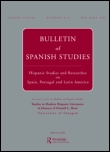
Bulletin of Spanish Studies
Connecting Scholars through Spanish Literary ExplorationBulletin of Spanish Studies is a prominent academic journal dedicated to the exploration and discourse of Spanish studies within the diverse realms of Cultural Studies and Literature and Literary Theory. Published by Routledge Journals, Taylor & Francis Ltd, this journal serves as a crucial platform for scholars, researchers, and students to disseminate their findings and engage in scholarly debates related to Spanish literature, culture, and linguistics. With an emphasis on high-quality, peer-reviewed research, the journal holds a reputable Q3 ranking in Cultural Studies and a commendable Q2 ranking in Literature and Literary Theory, reflecting its significant impact within the academic community. The Bulletin is indexed in notable databases, achieving a rank of #314 out of 1106 in Literature and Literary Theory and #738 out of 1304 in Cultural Studies, signaling its vital role in advancing knowledge in these fields. Although it does not currently offer open access options, the journal remains an essential resource for those passionate about the study of Spanish culture and literature from 2010 to 2024 and beyond.
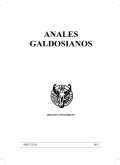
Anales Galdosianos
Illuminating Galdós: A Deep Dive into Literary ImpactAnales Galdosianos is a prominent academic journal dedicated to the study of the works and impact of Spanish author Benito Pérez Galdós, providing a platform for innovative research in the field of Spanish literature and culture. Published by the Asoc Int Galdosistas, Inc., this journal serves as a nexus for scholars, students, and professionals interested in critical studies, literary criticism, and historical contexts surrounding Galdós's contributions to literature. Situated within the broader scope of Hispanic Studies, Anales Galdosianos enriches the academic discourse by fostering an understanding of Galdós's influence on narrative forms and social issues during his time. While the journal does not operate under open access, it remains a valuable resource for those engaged in literary research and education. With its commitment to scholarly excellence, Anales Galdosianos continues to uphold Galdós's legacy, inviting submissions that challenge perspectives and deepen our comprehension of this essential figure in Spanish literary history. For further engagement or to submit works, prospective contributors are encouraged to contact Alan E. Smith, Director of the Department of Romance Studies at Boston University.

Anuario Calderoniano
Charting New Frontiers in Calderonian AnalysisAnuario Calderoniano is a distinguished academic journal published by IBEROAMERICANA EDITORIAL VERVUERT S L, dedicated to the field of literature and literary theory. With an ISSN of 1888-8046 and a notable presence in the academic community, it is recognized for its insightful analyses and contributions to Calderonian studies. The journal has been systematically published from 2013 to 2015 and from 2017 to 2023, consistently examining the works of renowned playwright Pedro Calderón de la Barca and their relevance in contemporary literary discourse. As a Q3 journal in the Literature and Literary Theory category for 2023, it ranks in the 68th percentile among its peers, reflecting its importance and scholarly contribution to the field. While currently not offering open access, the journal remains a crucial resource for researchers, professionals, and students aiming to deepen their understanding of literary narratives and critical perspectives.
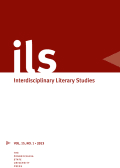
Interdisciplinary Literary Studies
Redefining Literature Through Interdisciplinary LensesInterdisciplinary Literary Studies is a prominent journal published by Penn State University Press that delves into the rich and diverse field of literature and literary theory. Established to foster scholarly dialogues, this journal embraces an interdisciplinary approach, making it a valuable resource for researchers, practitioners, and students interested in the multifaceted dimensions of literature. With an ISSN of 1524-8429 and an E-ISSN of 2161-427X, the journal operates without open access, reflecting its commitment to maintaining rigorous academic standards. The journal is ranked in the Q3 quartile of literature and literary theory for 2023 and holds a Scopus rank of #730 out of 1106, placing it in the 33rd percentile, which further emphasizes its emerging stature within the academic community. Spanning converged years from 2017 to 2024, Interdisciplinary Literary Studies continues to impact the dialogue within the humanities, encouraging nuanced analyses and interdisciplinary connections that push the boundaries of literary scholarship. Set in the United States, the journal is dedicated to exploring contemporary and historical texts, critical theories, and diverse literary forms, making it an essential publication for anyone passionate about the evolving landscape of literature.
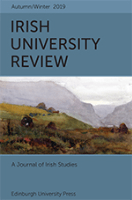
IRISH UNIVERSITY REVIEW
Advancing Scholarly Discourse in Irish LiteratureIRISH UNIVERSITY REVIEW is a distinguished academic journal published by Edinburgh University Press, specializing in the fields of Literature and Literary Theory. With an ISSN of 0021-1427 and an E-ISSN of 2047-2153, this journal serves as a vital platform for scholarly discourse on contemporary and historical literary studies related to Ireland and its cultural contexts. Located in the United Kingdom, the journal has achieved an impressive Q2 ranking in the 2023 category of Literature and Literary Theory, placing it in the 81st percentile among peer-reviewed arts and humanities journals globally, as per Scopus rankings. IRISH UNIVERSITY REVIEW is committed to fostering academic excellence and offers a range of access options for its readers, promoting both traditional and digital scholarship. With a publication timeline extending from 2002 to 2024, the journal is dedicated to enhancing understanding and appreciation of Irish literature through critical essays, reviews, and innovative research, making it an essential resource for researchers, professionals, and students alike.
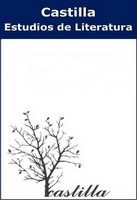
Castilla-Estudios de Literatura
Innovating Literary Scholarship for a New Era.Castilla-Estudios de Literatura is an esteemed academic journal published by EDICIONES UNIV VALLADOLID, dedicated to the exploration and analysis of literature and literary theory. With an ISSN of 1989-7383 and an E-ISSN of 1989-7383, this journal has provided Open Access content since 2009, ensuring wide accessibility to its scholarly materials. Hailing from Spain, specifically based at JUAN MAMBRILLA 14, VALLADOLID 47003, SPAIN, it has become a notable platform for researchers and scholars, achieving a respectable Q3 ranking in the 2023 category of Literature and Literary Theory, along with a Scopus rank of #637 out of 1106 in the Arts and Humanities. Covering a converging period from 2013 to 2024, this journal embraces a diverse range of literary analysis, aiming to foster critical discourse among academics, professionals, and students globally. Its commitment to high-quality research and open dissemination makes it an invaluable resource for those engaged in the literary field.

American, British and Canadian Studies
Exploring the Cultural Tapestry of North America and BritainAmerican, British and Canadian Studies, published by SCIENDO, is a distinguished open-access journal dedicated to the exploration of cultural, linguistic, and literary studies as they pertain to North American and British contexts. With an ISSN of 1841-1487 and an E-ISSN of 1841-964X, this journal has been a valuable scholarly resource since its inception, becoming fully open access in 2012. As of 2023, it has ranked in the Q2 category for Literature and Literary Theory, indicative of its growing influence and importance in the field. The journal notably covers a spectrum of disciplines, securing a Q3 ranking in both Cultural Studies and Linguistics and Language while also addressing aspects of Sociology and Political Science. Researchers, educators, and students will find the journal's diverse scope and rigorous peer-review process essential for understanding contemporary issues within these intertwined fields. With articles from 2017 to 2023 now converged for enhanced accessibility, American, British and Canadian Studies continues to foster dialogue and promote scholarly discourse across multiple disciplines.

World Literature Studies
Connecting Cultures through Critical Literary AnalysisWorld Literature Studies is a leading academic journal published by the Institute of World Literature at the Slovak Academy of Sciences, dedicated to advancing the field of literary studies. With an ISSN of 1337-9275 and an E-ISSN of 1337-9690, this journal has established itself as a prominent platform for scholarly research and discourse, earning a prestigious Q1 ranking in the Literature and Literary Theory category as of 2023, placing it in the top 25% of journals in its field according to Scopus metrics. Operating from Slovakia, the journal caters to a global audience, highlighting diverse perspectives in world literature and fostering interdisciplinary collaboration. Though it currently offers no Open Access option, it maintains a rigorous peer-review process that ensures the quality and integrity of published works. Researchers, students, and literary professionals alike will find the journal's comprehensive articles and critical analyses essential for staying informed about the latest developments and trends in literature and literary theory.

Janus-Estudios Sobre El Siglo de Oro
Unveiling the richness of the Golden Age.Janus-Estudios Sobre El Siglo de Oro is a distinguished academic journal dedicated to the exploration and analysis of the Golden Age of Spanish literature and culture. Published by SIELAE in collaboration with the University of Coruña, Faculty of Philology, this journal boasts a remarkable impact factor with a Q1 ranking in Literature and Literary Theory, demonstrating its significance in the field. Since its inception in 2012, Janus has maintained an open access publishing model, ensuring that groundbreaking research is accessible to scholars, professionals, and students alike. The journal covers a diverse range of topics within the realm of Arts and Humanities, with an admirably ranked performance in both literature and its associated interdisciplinary studies. With a commitment to showcasing critical insights and innovative research, Janus aims to contribute significantly to the scholarly discourse surrounding the Golden Age, making it an invaluable resource for anyone interested in this rich cultural period.
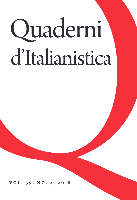
QUADERNI D ITALIANISTICA
Fostering Critical Discourse in Italian StudiesQUADERNI D ITALIANISTICA is a distinguished journal dedicated to the field of Italian Studies, focusing on literature and literary theory. Published by QUADERNI D ITALIANISTICA and based in Canada, this journal serves as a platform for scholars, researchers, and students alike to engage with critical analyses and scholarly contributions related to Italian literature. Although it has a Q4 ranking in the 2023 category of Literature and Literary Theory and a Scopus rank of #655 out of 982, the journal plays a pivotal role in fostering discourse within this niche. Since its inception in 2002, the journal has contributed significantly to the study of Italian literature, providing a valuable resource for those looking to explore thematic, historical, and narrative aspects of Italian texts. While access to the journal is not offered freely, its comprehensive coverage until 2018 and again in 2020-2021 ensures a rich archive for critical research endeavors. As such, QUADERNI D ITALIANISTICA remains an essential resource for anyone invested in the intricate landscapes of Italian cultural and literary studies.